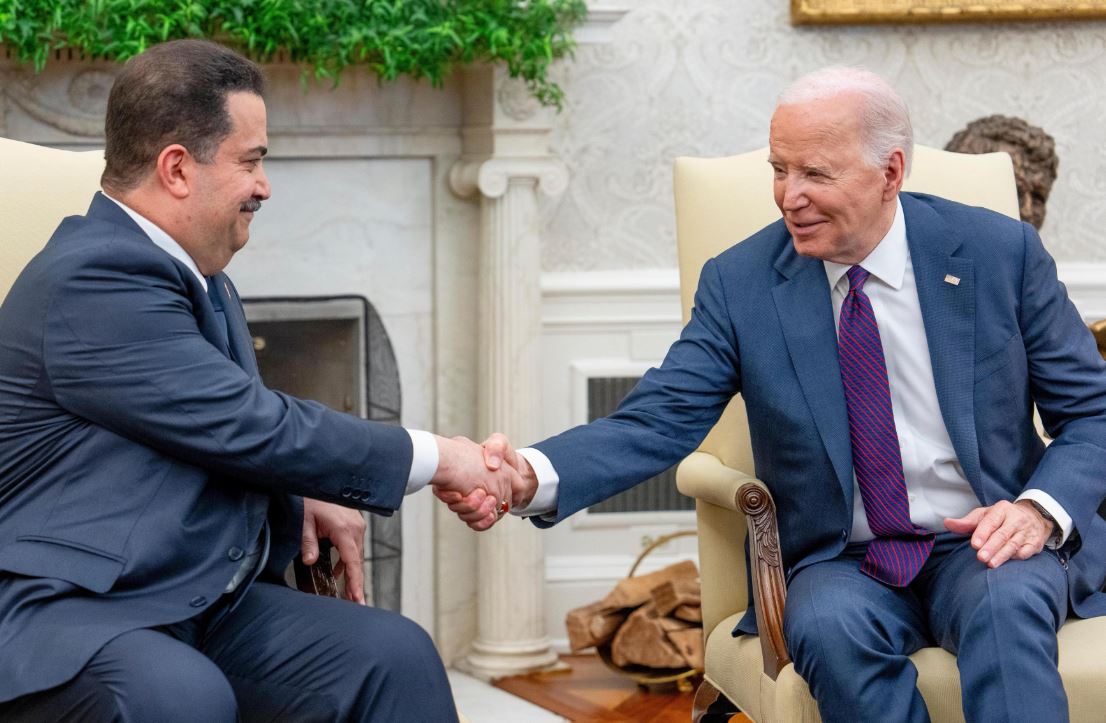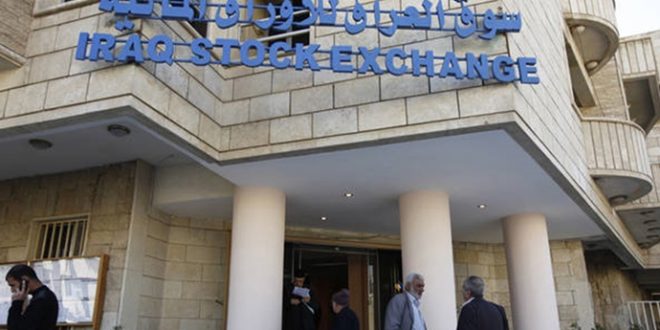KTFA
FRANK26: 'TO EXCLUDE IRAN'.......... THAT WAS THE GOAL OF THE MONETARY REFORM!!!".......F26
To exclude Iran... (THIS WAS THE GOAL OF THE MONETARY REFORM- F26) an American bet on the open energy doors in Iraq
8/21/2024
The American magazine "Forbes" highlighted the open doors for American companies in the Iraqi energy sector, considering that the United States government, in order to neutralize Iran, is working with these companies to accelerate efforts in the presence of Iraqi Prime Minister Mohammed Shia al-Sudani, whom it described as "pro-business", in order to achieve Iraq's independence from Iran in the field of energy by 2030.
The magazine indicated in a report translated by Shafaq News Agency that the American companies "KBR, Transatlantic Petroleum, Honeywell/UOP, Baker Hughes, Emerson, Arc Energy, and GE" are working with the Baghdad-based company "RASEP" in the field of infrastructure and energy development, in order to develop what could be one of the largest oil and gas fields in the world, specifically in the Bin Omar River in southern Iraq.
The report noted that the project includes an accompanying facility for exporting liquefied natural gas near Basra, which could become operational within the current decade, while the French-based company "Technip Energies" will develop the plan and feasibility study for the liquefied natural gas station, adding that other aspects of the project include collecting, compressing and processing the gas centrally and extending more than 400 kilometers of pipelines.
The report quoted RASEP Business Development Manager Ahmed Imad Al-Mohsen as saying that LPG and condensate exports alone could generate $100 million for the Iraqi treasury annually.
After the report pointed out that the Iraqi government had agreed to establish the first LNG import terminal in the southern port of Faw, which could be converted into an export terminal, Al-Mohsen was quoted as saying that Iraq is a welcoming market for American energy and technology companies.
According to Al-Mohsen, American investments contribute to stabilizing the Iraqi economy, creating thousands of direct and indirect job opportunities, strengthening Iraqi finances, reconstruction, and addressing emission reduction goals, adding that this helps “strengthen American government initiatives toward climate change.”
The report quoted Jay Ibrahim, head of sustainable technology solutions at KBR, as stressing the importance of the timing of this.
The report pointed out that KBR has been operating in Iraq since the 1970s, and has recently employed more than 500 people, including 150 Iraqis, to work on developing the energy and electricity sector.
The report also stated that during the visit of Iraqi Prime Minister Mohammed Shia al-Sudani to Washington last April, KBR signed a $12 million contract to handle the engineering side of the Bin Omar project, after which it will take over project management, engineering, procurement and construction.
According to Ibrahim, the Iraqi ministers are working in a way that shows the government is working with the private sector in a new way, which is “exciting and new and they have not done it before.”
The US report said the ultimate goal is to produce natural gas, build electrical infrastructure, provide surplus energy to allies and stop relying on Iran for energy.
The report quoted Al-Mohsen as saying that Iraq spends "about $5 billion annually on importing Iranian gas."
According to former US Undersecretary of Defense Robert Wilkie, Iran had only $5 billion in reserves in 2021 when President Donald Trump left office, adding that Iran is currently exporting one million barrels of oil per day, explaining that the Iranians "have returned to the levels of the Shah, which were in the 1970s."
The report added that Iran currently exports oil to 17 countries, including China, Oman and Bangladesh, noting that it consumes most of its natural gas production, except for what it exports to Iraq.
He added that Iran has the largest gas reserves in the world after Russia, and shares gas fields in the Gulf with Qatar, and it exported 18.04 billion cubic meters of gas via pipelines in 2022.
The report quoted the American Washington Institute as saying that Iran's oil exports increased by more than three times during the Joe Biden administration "due to the easing of US sanctions and the increase in Chinese demand for crude oil subject to large discounts."
After the report noted that the Trump administration had managed to prevent Iran from producing at the levels it is currently at, Wilkie was quoted as saying, “Iran is back. Their coffers are filling up, and they are capable of causing trouble all over the planet, especially in their own region.”
While the report noted that given the ease of transporting Iranian energy to neighboring countries, it is relatively cheap, Wilkie was quoted as saying, “It has a price, and the cost is high.”
According to Wilkie, developing the energy sector in Iraq is part of a larger effort to ensure American national security and stability in the Middle East. “In terms of American national security, looking at Iran as just Iran is not the right way to look at it,” he explained. “You have to look at it as part of a triad that includes Moscow and Beijing, so weakening the Iranians weakens the Chinese and weakens the Russians.”
Wilkie explained that weakening these governments requires more than making Iraq energy independent, which includes making the United States more energy-intensive so that countries do not have to rely on Russian gas or Iranian oil, noting that under Trump the United States has been able to secure cheap gas and oil for “our friends” while imposing sanctions and banning Iranian oil sales in the main.
"In theory, anything that allows the countries on the periphery of Iraq to be stronger is a counterweight to Iranian pressure, and the Iranians will have nothing to offer a country that has enough energy," Wilkie was quoted as saying in the report.
Wilkie spoke of the Trump administration's "strategic calculations" of how to establish a special "ring of deterrence" around Iran, and that the "Abraham Accords" were central to this strategy.
“We were working on the Saudis when Trump left office, which brought the Saudis closer to the anti-Iran ring that included Israel with U.S. support,” Wilkie was quoted as saying, adding that anything the Saudis could do to challenge Iranian influence “would make sense from a strategic military perspective.”
He pointed out that if Trump wins the upcoming elections, it "will be a renewed push to fully include the Saudis in this alliance."
While the report said that Iraq's oil production has increased according to the International Energy Agency, it noted that Iraq has struggled to capture and process gas, leaving its electricity system at risk.
The report quoted Al-Mohsen as saying, “The main pain point in the country is the lack of electricity, as during the summer, there is a deficit of about 12 hours per day of electricity supply.”
While Al Mohsen noted that flaring associated gas poses a huge risk to the environment and to government revenues, he said that one of the “top priorities on the prime minister’s agenda” is to reduce gas flaring.
The report added that RASEP has become the first Iraqi company to lead a gas development project in the country, noting that the government is currently working on building electricity transmission lines to connect them to the Kuwaiti, Jordanian and Turkish electricity networks.
After the report mentioned the results of Al-Sudani's visit to Washington and the joint statement that indicated the United States' support for Iraqi energy efforts, including completing the connection of the electricity grid with neighboring countries, including Jordan and other Gulf countries, and helping Iraq reopen the pipeline to Turkey.
Al-Mohsen was quoted as saying that "the US government supports such initiatives that enhance energy independence in Iraq, which will lead to the severing of all relations and all imports of natural gas and energy from Iran," noting that Washington "has long been pressing for the severing of relations with Iran."
According to Al-Mohsen, the money due from the Iraqi side to the Iranian side is in US dollars, and is a source of funding for the Iranian government.
He pointed out that American companies had so far focused on rebuilding the Iraqi government, and that most of those companies had dealt with the Ministry of Oil and the Ministry of Electricity, but that the private sector in Iraq had not been fully strengthened.
The report quoted Al-Mohsen as saying, "We have open doors to invest in energy projects, and we are the first Iraqi company to undertake a gas development project. In the past, this was allocated to the government side, and covered by the government," noting that international companies will participate in the upcoming licensing rounds to develop oil and gas fields.




